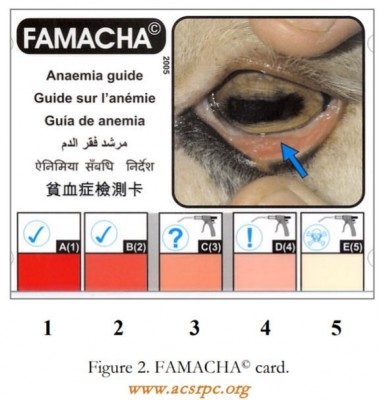How to get a Replacement FAMACHA Card
Amy Barkley, Team Leader & Livestock Specialist
Southwest New York Dairy, Livestock and Field Crops Program

If used frequently, FAMACHA cards should be replaced every 2-3 years to ensure that the color swatches on the cards are remain accurate. If used less frequently and kept in a dark place, these cards may last longer. Old, lost or damaged cards can now be replaced through a partnership with LSU.
If you are FAMACHA certified you can get replacement FAMACHA cards by contacting Dr. Vatta's Parasitology Lab at Louisiana State University. You will need to send an email to famacha@lsu.edu saying you need information on ordering a replacement FAMACHA card. You will need to verify that you are FAMACHA certified by either telling them when and at what workshop you were certified at and possibly who the instructor was OR attaching a photo of your certification form.
Upcoming Events
Boots in the Barn: Cornell Dairy Research Updates
January 13, 2026
January 20, 2026
January 27, 2026
February 3, 2026
February 10, 2026
February 17, 2026
February 24, 2026
Join us for some or all!
Deerworm and Flukes in Small Ruminants Webinar
February 25, 2026 : Deerworm and Flukes in Small Ruminants Webinar
Dr. Mary Smith from Cornell's College of Veterinary Medicine and Dr. Rachel White from UMaine Cooperative Extension will be discussing the lifecycles, signs, prevention, and management of deerworm and liver flukes in small ruminants.
NYSDEC How to Get Certified Course
March 3, 2026 : NYSDEC How to Get Certified Course
Ellicottville, NY
NYSDEC training course in preparation to take the pesticide applicator exam.
Announcements
Cows, Crops & Critters Newsletter Sponsorship
TRYING TO REACH GROWERS AND AGRIBUSINESSES IN OUR SOUTHWEST REGION OF NEW YORK?Weekly Email Update: Shared with 625+ households who have signed up with our program.
Monthly Paper Mailer: To reach our stakeholders and farmers who lack internet access, we send out a monthly mailer where your company's logo and contact information would be featured with a mailing list of 330+ households.
If you sponsor our weekly and monthly publications you reach approximately 955 households.





